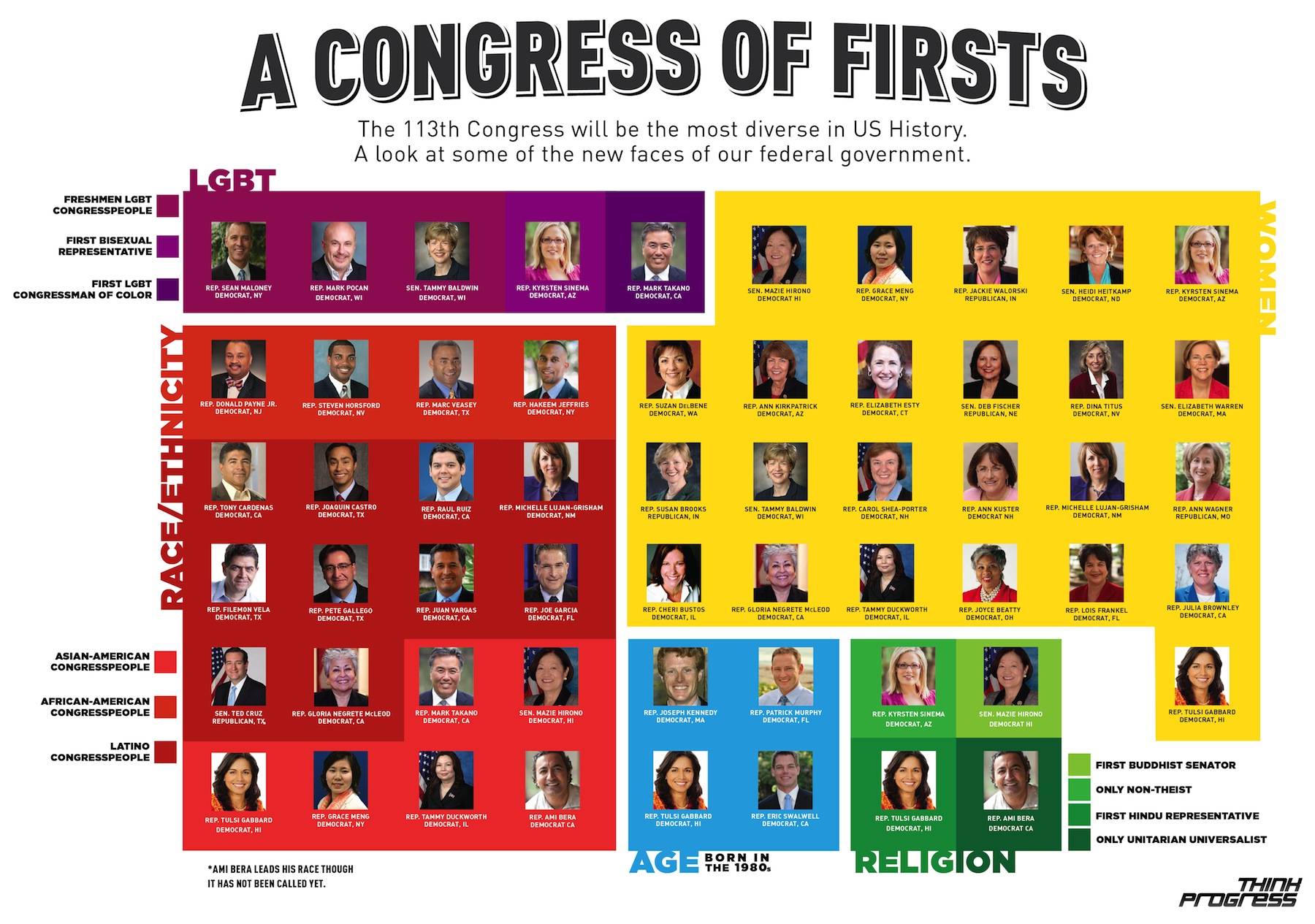Religious Diversity in Congress, A Year of "Firsts"

With over 120 million ballots cast, voters changed the face of the US Congress. As a byproduct of electing new Representatives, Americans elected the first Hindu, non-theist, and Unitarian Universalists members of Congress, and the first Buddhist Senator. The 113th Congress will also see 78 women representatives, the first bisexual Congresswoman, 4 more African-American members, 10 new Latinos, and 5 new Asian-Americans.
The election of a religiously diverse 113th Congress can partially be attributed to shifting religious attitudes in America. According to an October Pew Research Center study, one-in-five adults now have no religious affiliations. Furthermore, one third of adults under 30 are religiously unaffiliated. Pew reports,
"In the last five years alone, the unaffiliated have increased from just over 15% to just under 20% of all U.S. adults. Their ranks now include more than 13 million self-described atheists and agnostics (nearly 6% of the U.S. public), as well as nearly 33 million people who say they have no particular religious affiliation (14%)."
Reflecting the increasingly diverse population in the United States is the most diverse Congress in history, including Tulsi Gabbard, Mazie Hirono, Kyrsten Sinema, and Ami Bera. These four representatives mark multiple "firsts" for Congress, and America as a society.
Tulsi Gabbard
On Tuesday, Tulsi Gabbard was elected to represent Hawaii's second Congressional district, making history as the first Hindu-American to be elected into the US House of Representatives. Taking into account her religion, Gabbard will be taking her oath to office over the Bhagavad Giva instead of the Bible, as she practices the Vaishnava branch of Hinduism. Hopeful of her influence in Congress, she said:
"Hopefully, the presence in Congress of an American who happens to be Hindu will increase America's understanding of India as well as India's understanding of America."
Gabbard is not only the first Hindu Member of Congress, but she is one of the first female combat veterans in Congress.
Mazie Hirono
Also from Hawaii, Hirono beat her opponent with nearly 62 percent of votes, winning her race for U.S. Senate. Hirono was born in Fukushima, Japan and after winning her election Tuesday, became the first Buddhist senator. After her victory, she told the Associated Press, "What it reflects is that we need a lot more diversity in the United States Senate."
Kyrsten Sinema
Elected in Arizona's 9th district, Sinema is the only non-theist elected to Congress, meaning she does not believe in a personal god or gods. The former Democratic State Senator is also the first openly bi-sexual Member of Congress, showing the increasingly accepting attitudes of voters in Arizona's 9th district.
Ami Bera
As the only Unitarian Universalist in Congress, Ami Bera beat veteran Republican Dan Lungren in one of the most costly Congressional races nationwide. Winning one of the ten highly sought after races by California Democrats, Bera will represent California's 7th Congressional District. His religious association, characterized as "free and responsible search for truth and meaning," was not the focal point of his campaign. Rather his commitment to the middle class and plan to "move America forward" is likely what won him the race.
As with gender and race, the principles of religious freedom are among those on which America was founded. It's long overdue that our country breaks down the barriers in place for religiously diverse candidates and starts electing candidates outside of the Christian faith. And while the 113th Congress is still dominated by white males, the advancements made in 2012 bring us one step closer to a more representative government.




